
农妇,母语一般,其他语言更一般,但这些都没有能阻挡我对各种语言和文字的热爱,哪怕是看看也好。
What is the difference between Ukrainian and Russian
According to the current language division, Ukrainian, Russian and Belarusian are all classified into the East Slavic group of Slavic languages, which can be said to be close relatives, but in fact people who only speak one of these two languages communicate with each other The difficulty is not small, and a comparison that is not very accurate is equivalent to chatting with people in Shanghai and Wenzhou.
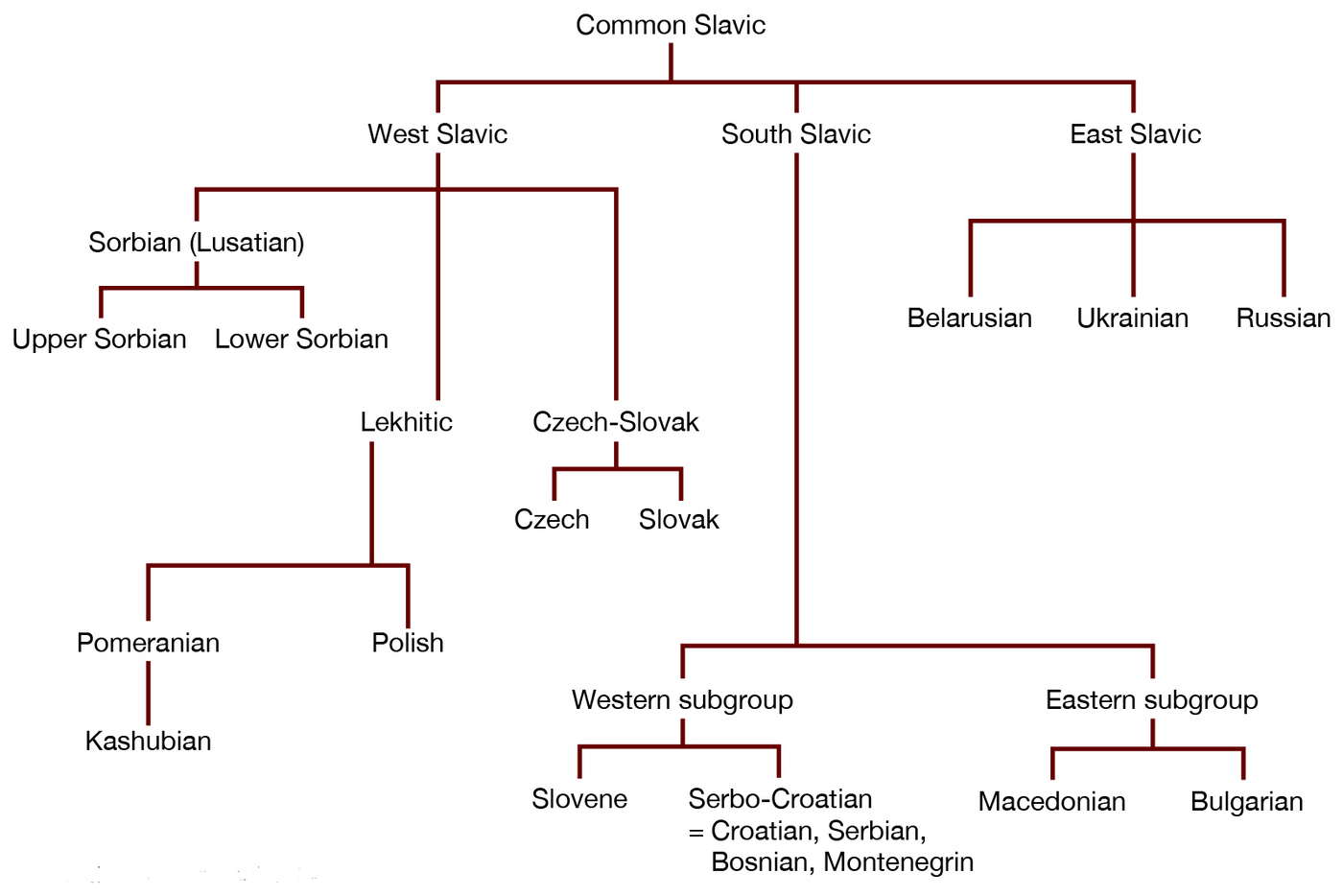
Ukrainian and Russian, though so similar, also use a common Cyrillic alphabet, have similar grammars, and have obvious cognates. However, due to the special cultural development of Ukrainians and Russians, there are obvious differences in their languages as a whole.
For the average person, the most easily recognizable difference between Russian and Ukrainian is the letters. The Ukrainian alphabet was formed at the end of the 19th century. The difference from Russian is that Ukrainian does not have the letters Ё, Ъ, Ыы, Ээ, But there are four more letters: Ґґ, Єє, Іі, Її.
It is also because of the differences in these letters that in Russian pronunciation, some pronunciations will be different from Ukrainian. For example, there is no letter "Ї" in Russian, their sound will be close to "ЙИ", the extra "Г" in Ukrainian is a kind of laryngeal fricative, and it is difficult to find similar in Russian.
Modern linguists have found that Ukrainian is more closely related to other Slavic languages than Russian, the closest being Belarusian (with 29 common language features), followed by Czech and Slovak (23), Polish ( 22), Croatian and Bulgarian (21), and only 11 grammatical features in common with Russian. On the basis of this fact, some linguists even question whether Russian and Ukrainian should be placed in one language group.
Statistically, there is only 62% common vocabulary between Russian and Ukrainian. As a result, in terms of lexical commonality with Ukrainian, Russian ranks fifth behind Belarusian, Polish, Slovak and Czech. You know, the common vocabulary rate of English and Dutch is 67%.
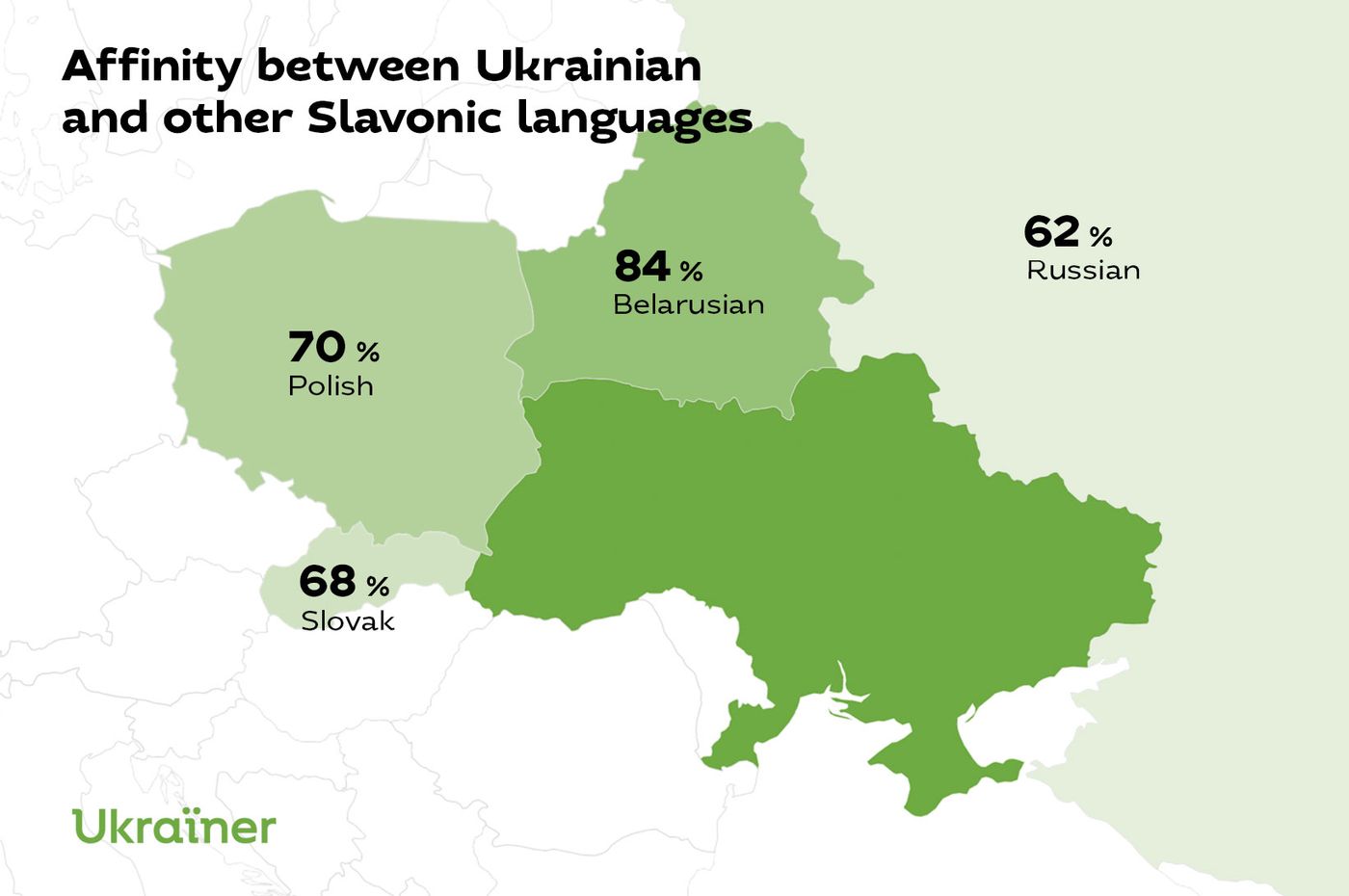
This difference between Russian and Ukrainian is mainly due to the particularity of the composition of the two ethnic groups. The concentration of the real Russian nation around Moscow has resulted in its vocabulary being diluted by Finno-Uralic and Turkic. The Ukrainian nation is composed of the southern Rus people (that is, the descendants of the earliest known Rus), so the Ukrainian language retains its ancient Rus origin to a considerable extent (explain here: The original pronunciation of Russian is Rus, The reason why Chinese is called Russia is influenced by Mongolian. Mongolian cannot directly pronounce the sound of russ, and must add a vowel close to o in front, thus becoming orussian - "Russia", similar to Spanish España).
By the mid-16th century, Ukrainian and Russian were already distinctly different. The Middle Ukrainian texts of the time were generally understandable by modern Ukrainians, but more difficult for modern Russians.
With the formation of the Russian literary language in the first half of the 18th century, a more pronounced difference between the two languages emerged. The heavily borrowed Church Slavic vocabulary in Russian at this time left Ukrainians completely baffled.
For example, "благодарỳ" (meaning thanks) in Church Slavonic borrowed from Old Russian is pronounced "благодарю" in today's Russians. The Ukrainian language of the same period retained the old "дáкую" (also meaning thanks), which is now pronounced "дякую" in Ukrainian.
From the end of the 18th century, Ukraine's own literary language began to take shape, which, along with other pan-European languages, gradually shed its association with Russian. One of the greatest contributors was the poet and painter Taras Shevchenko.
Combined with the distaste for Church Slavic and the focus on folk dialects, Ukrainian borrows some new words from the vocabulary of other Eastern European languages.

The table above visually shows how close the basic vocabulary of modern Ukrainian is to other Eastern European languages and how far it is to Russian.
In addition, Ukraine has a high dialect diversity, due to the fact that parts of western Ukraine were once part of countries such as Austria-Hungary, Romania, Poland and Czechoslovakia. Therefore, some dialects of western Ukraine are even more difficult for Russians.
And in terms of common vocabulary, Ukrainian and Russian also have differences. For example, words with the same spelling may have semantic differences and may also be different in parts of speech. For example, the word жаль (poor) has the same meaning in Russian and Ukrainian, and both are adjectives, but in Ukrainian it can also be used as a noun, and the meaning is slightly different, closer to the meaning of "regret" .
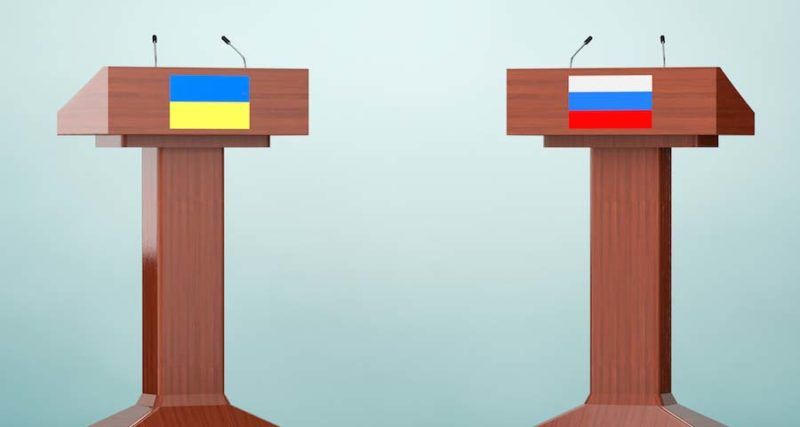
The grammar of Russian and Ukrainian is also different, and it is relatively easier for people from other European countries to learn Ukrainian because Ukrainian is more closely related to other European languages than Russian. European linguists have long noticed that translating from French or English into Ukrainian is in some ways simpler and easier than translating into Russian. A joke often used by linguists is that in many European languages, the grammatical structure of the following sentence is the same, "поп имел собаку" (the Pope has a dog), only Russian to express it as "у попа была собака" (with the Pope was a dog). However, this only reflects the differences in individual grammars between languages. The joke in linguistics itself has no valuable judgment, that is, the difference between which is better and which is worse.
Although Ukrainian borrows more vocabulary and grammar from other Eastern and even Western European languages than Russian, there are some exceptions. For example, Russian borrows words from Latin for month: for example, Russian "Март" (March ), March in English, martii in Latin, März in German, and mars in French. Ukrainian, on the other hand, retains the Proto-Slavic vocabulary, using "березень" (berezyen') for March, which actually derives its etymology from the word "white birch", because the birch tree sprouts at this time.
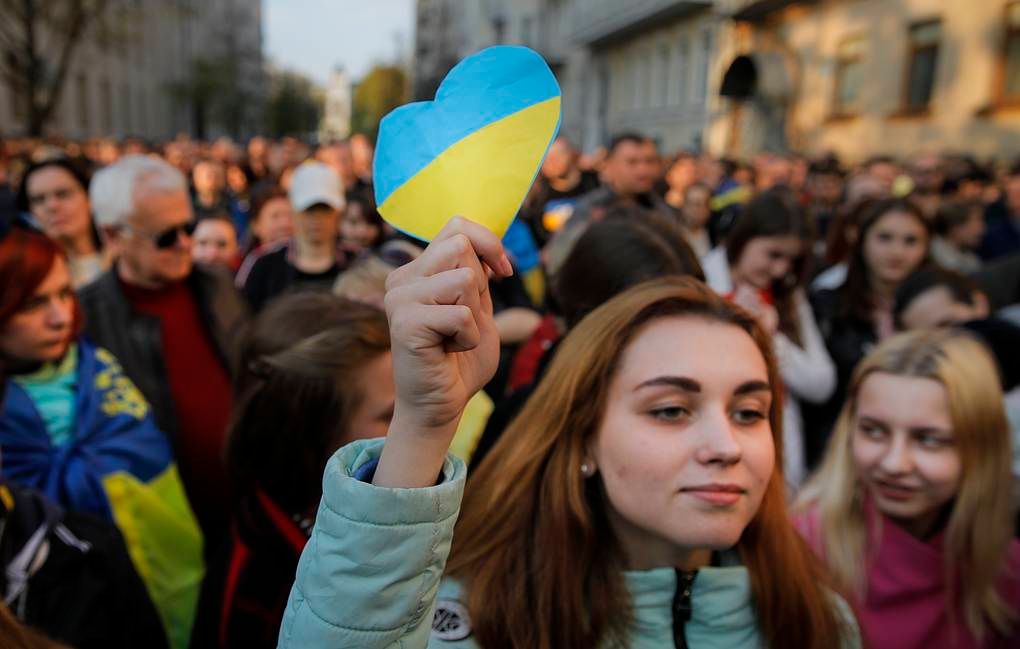
But in Ukraine under Soviet rule, the Ukrainian language was suppressed as a political tool (similar to today's massive promotion of Mandarin in mainland China), Ukrainian publications were banned, and Russian was compulsory in all Ukrainian schools , which is why many Ukrainians today are bilingual. After Ukraine became independent, Ukrainian became the first official language, and Ukrainians also began to speak Ukrainian as an important symbol to distinguish themselves from Russia. Most Ukrainians identify as their first language Ukrainian, although they understand and speak Russian. However, in regions with a strong Russian identity in the east and south, Russian is more spoken, as is evident in the graph below.
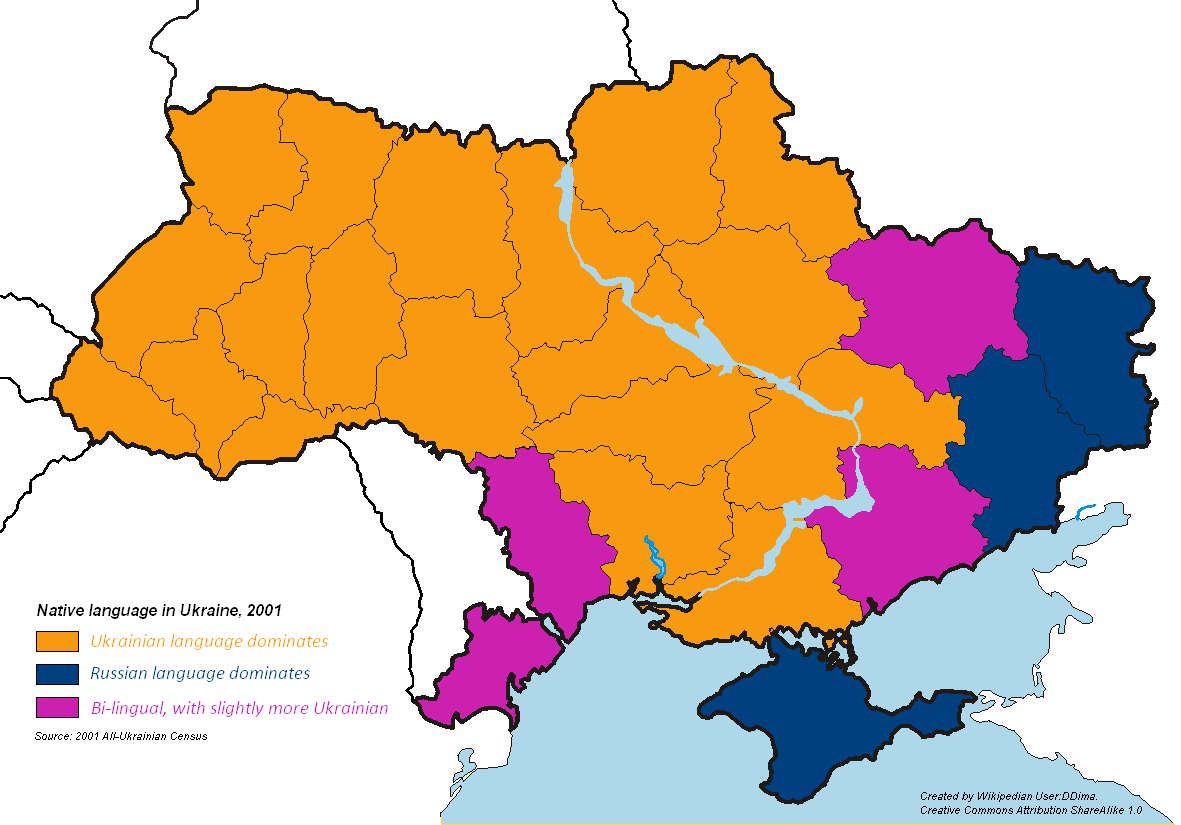
Although putting language together with politics, identity, ethnicity, etc. is something that linguistics wants to avoid as much as possible. But at this moment, in this special moment, when we talk about Ukraine, please respect the choice of Ukrainians and do not confuse Ukrainian with Russian.
Like my work?
Don't forget to support or like, so I know you are with me..
Comment…